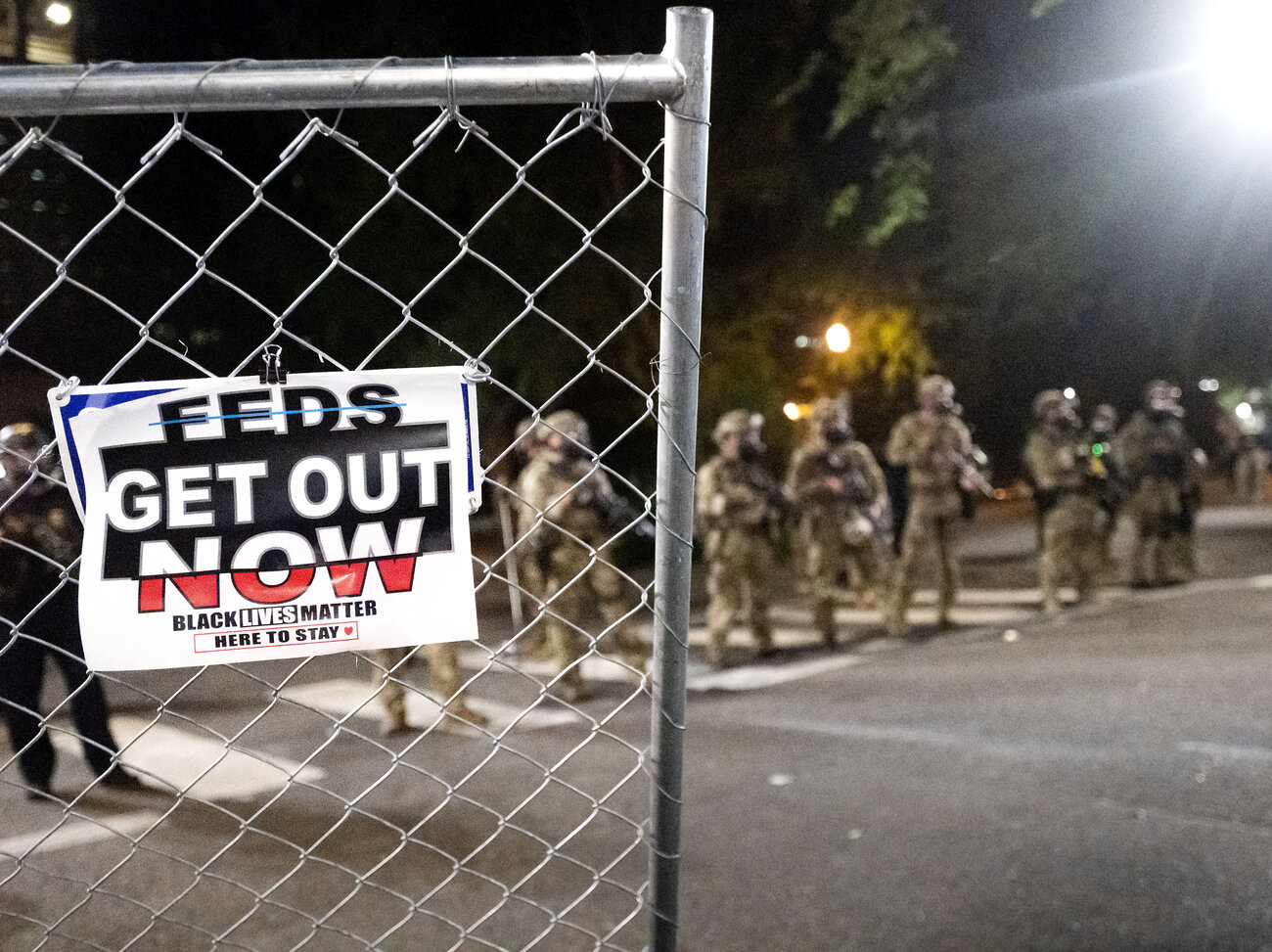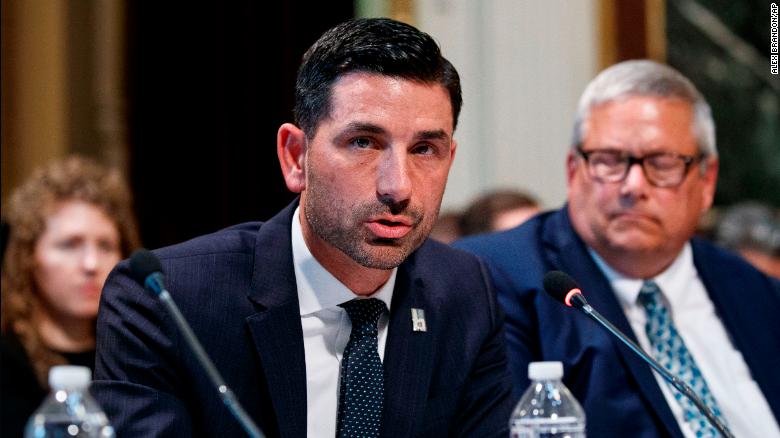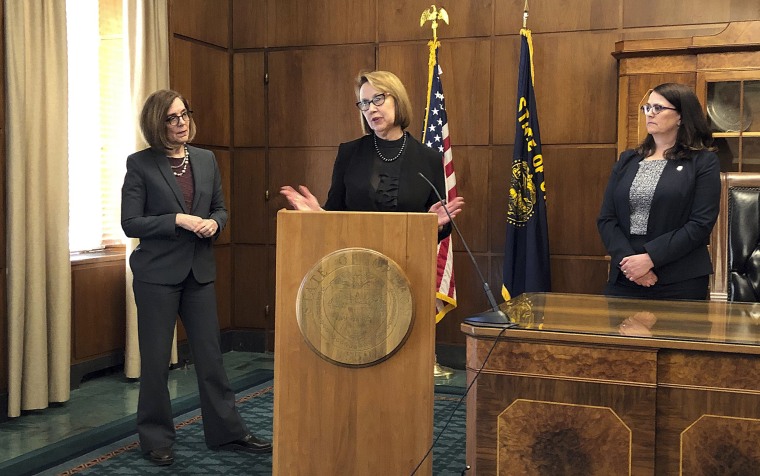
Federal law enforcement agents occupy Portland, Ore. U.S. Agents add "gasoline to the fire."
As federal law enforcement agents continue to occupy Portland, Ore., state and local officials are demanding that they leave. Protesters have demonstrated in the city's downtown for more than 50 nights since George Floyd died after a Minneapolis police officer knelt on his neck.
"There's absolutely no question that by having the presence of federal officers here, it's simply like adding gasoline to a fire," Oregon Gov. Kate Brown said in a weekend interview with NPR.
On Sunday, a new image of the stiff federal response in Portland went viral: a video of 53-year-old Navy veteran Christopher David being struck repeatedly with a baton wielded by a federal law enforcement officer.
//twitter.com/i/status/1284733976582615040
A graduate of the U.S. Naval Academy and a former member of the Navy's Civil Engineer Corps, David told The Washington Post that he hadn't previously been to any protests, but he wanted to know how the federal officers thought about their oath to defend the Constitution.
"Why are you not honoring your oath to the Constitution?" he says he yelled at the officers. Video shows an officer dressed in camouflage hitting David with a baton and another officer spraying him in the face with a chemical irritant.
"I stood my ground at that point and just stayed there. ... I did nothing provocative. They just started waling on me with batons, and I let them," David told The Independent. He was left with a broken hand.
Oregon Public Broadcasting reported Friday that federal law enforcement officers have been using unmarked vehicles in downtown Portland to grab and detain protesters.
 In an interview Sunday with NPR, Portland Mayor Ted Wheeler blamed the federal government for making things worse in the city.
In an interview Sunday with NPR, Portland Mayor Ted Wheeler blamed the federal government for making things worse in the city."We have an already heightened situation. It's already tense," Wheeler said. "But after nearly five weeks of demonstrations, we are starting to see that small handful of people who were engaged in criminal activity — it was dissipating. It was calming down. We believed a week ago it would be over by this weekend. But what happened instead is the feds stepped in with a very heavy-handed approach, and it blew the lid off the whole thing."
"With the federal government, they won't even identify who they are," Wheeler said. "We don't know why they're here. We don't know the circumstances under which they're making arrests. We don't know what their policies are or what accountability mechanisms there are, to the point where even the U.S. attorney here in the state of Oregon is calling for an investigation, wondering, where was the probable cause to pull these people off the streets into unmarked cars?"
President Trump defended the federal response. "We are trying to help Portland, not hurt it," he tweeted on Sunday. "Their leadership has, for months, lost control of the anarchists and agitators. They are missing in action. We must protect Federal property, AND OUR PEOPLE."
 Acting Homeland Security Secretary Chad Wolf brushed aside criticism that federal officers are inciting violence.
Acting Homeland Security Secretary Chad Wolf brushed aside criticism that federal officers are inciting violence."I don't need invitations by the state, state mayors or state governors to do our job," Wolf said Monday on Fox News. "We're going to do that, whether they like us there or not."
He called the protesters "violent anarchists and extremists" and said they were "violent well before DHS surged assets into Portland."
Wolf said the Department of Homeland Security will defend Portland's Mark O. Hatfield U.S. Courthouse from destructive acts despite requests from state and local authorities that federal officers leave.
As Oregon Public Broadcasting's Jonathan Levinson told NPR's Morning Edition, Portland police initially reacted with force to the protests, using tear gas and rubber bullets. Activist groups and protesters sued the city and won a temporary restraining order, limiting law enforcement's use of tear gas and rubber bullets — but it doesn't apply to federal law enforcement.
The federal officers in Portland are from the U.S. Marshals Special Operations Group, a SWAT-like unit from U.S. Customs and Border Protection and the Federal Protective Service, Levinson said. They started taking a more active role clearing protesters from around the courthouse on July 1.
On July Fourth, the federal police made a show of force, dispersing the crowd but then continuing across the street and into the city for blocks, alongside the Portland police. Last week, a protester was shot in the head with a less lethal round and severely injured.
Early Monday morning, the Portland Police Bureau released a statement describing federal law enforcement's role in Sunday night's protests and making clear that local police had not played any part in engaging with crowds or releasing tear gas.
Trump has called the protests "totally out of control." Ken Cuccinelli, the acting deputy DHS secretary, seemed to blame the restrictions on Portland's mayor, telling NPR last week that Wheeler "holds back to a certain extent his own law enforcement."
On Friday, the U.S. senators from Oregon, Jeff Merkley and Ron Wyden, as well as U.S. Reps. Earl Blumenauer and Suzanne Bonamici asked the Justice Department and DHS to investigate "the unrequested presence and violent actions of federal forces in Portland."
 Oregon Attorney General Ellen Rosenblum filed a lawsuit Friday against the DHS and other federal agencies and alleged that they have "engaged in unlawful law enforcement in violation of the civil rights of Oregonians by seizing and detaining them without probable cause."
Oregon Attorney General Ellen Rosenblum filed a lawsuit Friday against the DHS and other federal agencies and alleged that they have "engaged in unlawful law enforcement in violation of the civil rights of Oregonians by seizing and detaining them without probable cause.""The federal administration has chosen Portland to use their scare tactics to stop our residents from protesting police brutality and from supporting the Black Lives Matter movement," Rosenblum said in a statement. "Every American should be repulsed when they see this happening. If this can happen here in Portland, it can happen anywhere."